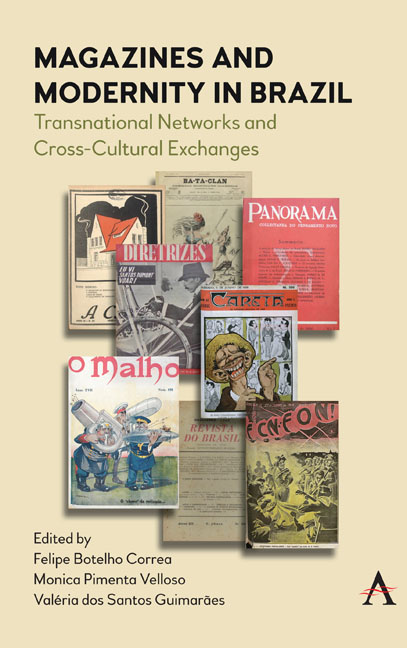Book contents
- Frontmatter
- Contents
- List of Figures
- List of Contributors
- Introduction
- Chapter 1 The French Periodical Print Culture In Brazil: A Survey of Catalogues and Mediators (1800–1945)
- Chapter 2 The Transnational Model of Popular Illustrated Magazines: Three Case Studies from Brazil (1900–20)
- Chapter 3 The Transnational Networks of the Modernist Periodical Print Culture: The Magazine Lumière in the Aftermath of WWI
- Chapter 4 Versions of Modernity in the Household Magazine A Casa (1923– 45)
- Chapter 5 Panorama Magazine and the Far-Right in Brazil (1936–37)
- Chapter 6 Against Nazi-Fascism in Brazil: The Case of the Magazine Diretrizes (1938–44)
- Chapter 7 Literary Inquiries and Disputes on Global Modernism: the Debate in Brazil During WWII
- Chapter 8 Modernity and Modernisms in the Magazine Sombra (1940–60)
- Index
Chapter 6 - Against Nazi-Fascism in Brazil: The Case of the Magazine Diretrizes (1938–44)
Published online by Cambridge University Press: 04 February 2022
- Frontmatter
- Contents
- List of Figures
- List of Contributors
- Introduction
- Chapter 1 The French Periodical Print Culture In Brazil: A Survey of Catalogues and Mediators (1800–1945)
- Chapter 2 The Transnational Model of Popular Illustrated Magazines: Three Case Studies from Brazil (1900–20)
- Chapter 3 The Transnational Networks of the Modernist Periodical Print Culture: The Magazine Lumière in the Aftermath of WWI
- Chapter 4 Versions of Modernity in the Household Magazine A Casa (1923– 45)
- Chapter 5 Panorama Magazine and the Far-Right in Brazil (1936–37)
- Chapter 6 Against Nazi-Fascism in Brazil: The Case of the Magazine Diretrizes (1938–44)
- Chapter 7 Literary Inquiries and Disputes on Global Modernism: the Debate in Brazil During WWII
- Chapter 8 Modernity and Modernisms in the Magazine Sombra (1940–60)
- Index
Summary
The magazine Diretrizes (1938–44) was one of the most acclaimed periodicals during the Estado Novo (1937–45) in Brazil. The short history of the magazine is one of the transformation from a platform for authoritarian ideas to an outlet against Nazi-Fascism and its influence in national politics. The magazine was founded by Azevedo Amaral (1881–1942), who graduated in medicine in Germany, but later started a career as a political journalist in England, where he worked as a correspondent in the early twentieth century writing the column ‘Letters from London’ for the Brazilian newspaper Correio da Manhã for 12 years. When he returned to Brazil, he founded and collaborated with several journals, with numerous articles defending state intervention in the economy and making a harsh criticism of the liberal model. He had already acquired substantial political influence when he invited the young journalist Samuel Wainer (1912–1980) to work with him on the launch of the magazine Diretrizes.
The aim of the magazine was to discuss the guidelines for the nation's future after the coup d’état led by Getúlio Vargas in November 1937. The content featured news and articles on national politics but also maintained an extensive coverage of world news, most importantly, the debates in Europe at the brink of World War II. However, a few months after the magazine was launched, Amaral left the magazine and founded a new one (Novas Diretrizes) due to a clash of political views with Wainer. Amaral continued his support for the Estado Novo that he had already showed in his editorial pieces published in Diretrizes, defending state intervention in the economy, criticizing liberalism and advocating the establishment of an authoritarian state to accelerate the industrialization of the country. He went on to become one of the most active ideologues of the Estado Novo until his death in 1942. Left in the hands of the16 young Wainer, Diretrizes soon started to move to another direction, embracing the role of being the opposition to the government and advocating for freedom of the press.
Wainer was the son of poor Bessarabian Jewish immigrant parents who had settled in São Paulo.
- Type
- Chapter
- Information
- Magazines and Modernity in BrazilTransnational Networks and Cross-Cultural Exchanges, pp. 115 - 128Publisher: Anthem PressPrint publication year: 2020



